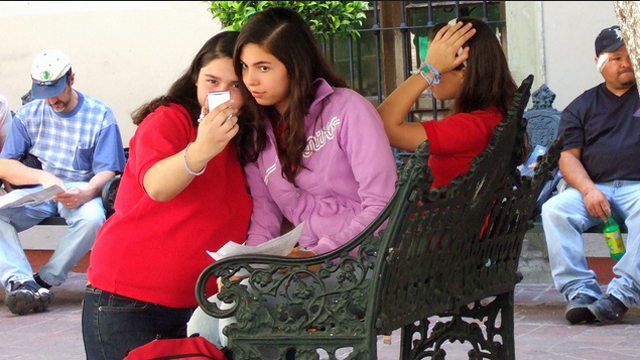Assuming for now that teens today might be more narcissistic than they were in the past (which, by the way, not everyone does), some psychologists say narcissism can be a coping mechanism that actually benefits millennials.
“I think of narcissism as an adaptive thing that teenagers use to work on self-image and identity,” University of Notre Dame psychologist Daniel Lapsley told Youth Radio. Given the issues today’s teens have to deal with — fierce competition for college, a tough job market, and, thanks to the Internet, less privacy than any previous generation — he says that teens may need a slightly inflated sense of self in order to successfully overcome the challenges they’ll face.
“A certain sense of invulnerability is a good thing,” he said. “There’s going to be occasions in your life where you have to engage in behavior where it’s not certain. Asking someone for a date or applying to college. If it goes the wrong way your self-esteem is at risk.”
Resource
AUDIO: Are Teenagers Today More Narcissistic? (Youth Radio Podcast)
Are teens today more narcissistic than ever before? Some psychologists are pointing to a personality test called the Narcissism Personality Inventory, which seems to indicate that millennials have a historically high sense of self-obsession. But not everyone thinks the test is a great tool to use on teens, who may need an inflated sense of self to protect themselves against the natural pitfalls of puberty. In this week’s podcast, Youth Radio’s teen reporters turn the lens on themselves as they investigate their own narcissism scores, and interview an expert on what this trend might mean for the success of the next generation.
To respond to the Do Now, you can comment below or tweet your response. Be sure to begin your tweet with @KQEDedspace and end it with #DoNowMe
For more info on how to use Twitter, click here.
We encourage students to reply to other people’s tweets to foster more of a conversation. Also, if students tweet their personal opinions, ask them to support their ideas with links to interesting/credible articles online (adding a nice research component) or retweet other people’s ideas that they agree/disagree/find amusing. We also value student-produced media linked to their tweets. You can visit our video tutorials that showcase how to use several web-based production tools. Of course, do as you can… and any contribution is most welcomed.
For inspiration, here is a link to the conversation that #DoNowMe inspired when it was originally published in February 2015.
More Resources
ARTICLE: Seeing Narcissists Everywhere (New York Times)
This New York Times article explores Dr. Jean M. Twenge’s study of cross-generational narcissism. Using data from the Narcissistic Personality Inventory (NPI), Dr. Twenge concludes that rates of narcissism found by the NPI have risen over time, notably amongst the Millennial generation. Dr. Twenge’s analysis garners criticism from other psychologists, who argue that the NPI test is inherently flawed, and even that Dr. Twenge may be misinterpreting this data. Whereas the NPI may show a rise in characteristics that Dr. Twenge attributes in narcissism, critics claim the test more so reveals findings of qualities such as confidence and self-worth, which cannot always be directly tied to narcissism.
AUDIO: How Millennials Are Reshaping Charity And Online Giving (NPR)
This feature from NPR’s All Tech Considered looks at a counterargument to the idea of growing narcissism in the Millennial era – that Millennials are spending and giving more of their money for social good. Looking at giving patterns, the story claims that Millennials feel more of an obligation to give money to charitable causes, and also care more about investing in causes where the impact of their giving can be directly seen.
TEST: Narcissistic Personality Inventory (Personality Tests)
The Narcissistic Personality Inventory (NPI) is a test designed in 1979 that rates levels of narcissism by asking participants to select what best reflects themselves from a series of paired statements. NPI data has been evaluated over the years by various field experts, including the aforementioned study from Dr. Jean M. Twenge.
